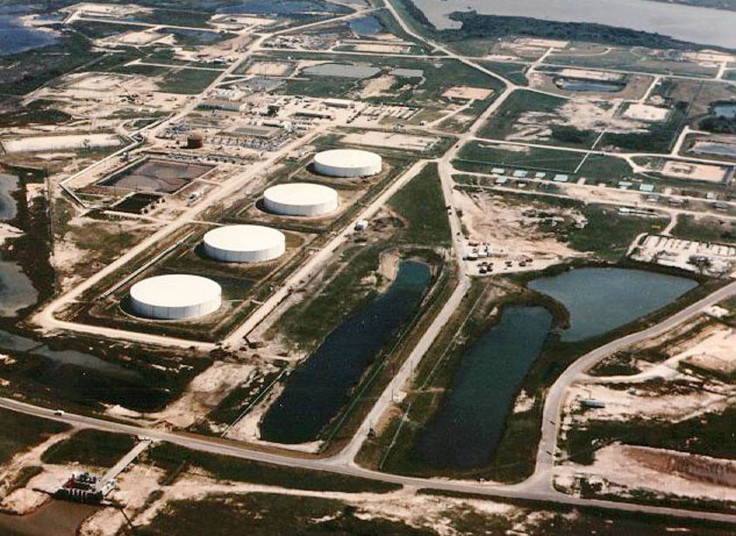Let's Shut Down The Strategic Petroleum Reserve

It's been 40 years since the Strategic Petroleum Reserve, or SPR, a massive volume of crude oil being stored on the Gulf coast, was a gleam in the government's eye. What better way to celebrate the milestone than to give the project a permanent rest?
Consider why it was set up in the first place. The government created the SPR in the 1970s, after the 1973 Organization of the Petroleum Exporting Countries, or OPEC, oil embargo as protection against any subsequent attempt by the cartel to blackmail the industrialized world with another 70 percent price hike. But in the nearly 40 years since the SPR was conceived, a few things have changed.
For one thing, non-OPEC production is now a much greater part of global supply than ever. Russia, for example, is the world’s second-largest oil producer behind Saudi Arabia. More important, crude oil production in the United States -- already the third largest in the world -- is soaring, and may in the not-too-distant future turn the nation into a net exporter of crude oil. In other words, we’re sitting on a virtual ocean of crude oil. And now that American petroleum engineers have figured out how to combine hydraulic fracturing and horizontal drilling in a commercially viable way, our crude oil production is shooting up. In 2005, we produced 154.46 million barrels; in 2012 we produced 219.78 million barrels. That’s a 42 percent increase in the last seven years, and there's lots more growth to come. In other words, we’re sitting on a virtual ocean of crude oil -- or what could reasonably be called a strategic petroleum reserve.
For another thing, many OPEC members have come to understand that the industrialized world has both the capacity and the demonstrated willingness to put itself on a permanent petroleum diet. In essence, OPEC has discovered that exorbitant prices choke demand. Today’s call on OPEC crude, as a proportion of total oil demand, is vastly diminished from its 1970s heyday. That’s why OPEC has not tried the let’s-stick-it-to-our-customers shtick in decades. Periodically, a few OPEC members whose petroleum reserves will be depleted sooner than other members’ reserves will be depleted clamor for big price hikes; but invariably the OPEC members whose reserves will last throughout this century, or longer, put the kibosh on that. These days, basically, the cartel is not behaving badly.
The fact is, OPEC is a shell of its former self, still a force when it comes to pricing, but hardly the monolith that once intimidated Western governments. Even if Iranian gunboats were able to halt tanker traffic through the Strait of Hormuz -- something the Islamic Republic could only pull off for a few days, anyway -- it would result in a temporary price shock because about 40 percent of the world's crude oil supply must transit that maritime choke point.
In the 1970s, our economy could not have survived without the uninterrupted flow of crude oil moving out of the Persian Gulf at market prices. Today it can. Besides our own soaring crude oil production, there are the huge crude oil supplies from our next-door neighbors, Mexico and Canada, the world’s fifth and sixth largest oil producers, respectively. Remember how casually some people used to chatter about about “peak oil?” They don't do that now, for good empirical reason.
So Point No. 1 is this: We're not still living in 1973. Things change.
Point No. 2 is: Getting rid of the SPR would make lots of folks happy.
Even though there are roughly 47 days of potential gasoline supply that could be refined from SPR crude, it would take years to completely refine it all into gasoline, years during which the extra transportation fuel steadily being put on the market would weigh on the U.S. retail price of gasoline and diesel. In other words, sell off SPR crude and you can lock in years of serious downward pressure on gasoline prices. Anybody who has to pay for gasoline or diesel should like that.
Secondly, Washington could save some money by not paying people to maintain the SPR. The government employs about 115 people to work on SPR matters. Also, there are 807 full-time equivalent contractor employees working on SPR matters. If we end the SPR, taxpayers won’t have to pay salaries, medical benefits or those Cadillac pensions. It's a drop in the bucket compared to the national debt, but young people who will be stuck digging out from the ever-ballooning national debt should appreciate the gesture.
Thirdly, the average acquisition price of the 700 million barrels of crude oil in the SPR is roughly $30. Today the price is around $100, so taxpayers -- assuming the government didn’t return the money to its constituents -- would make about $70 per barrel or, if all the oil was sold, roughly $50 billion. That’s enough to a.) “save” Detroit, or b.) construct a gargantuan levee to protect New York City from the next Hurricane Sandy or c.) be used by Washington to pander to their most powerful constituents.
Finally, killing off the SPR would mean no more worries about groundwater pollution from crude oil leaking out of the SPR. People who drink water should like that.
As for the U.S. being obliged, as a member of the International Energy Agency, or IEA, to maintain 90 days of oil stocks, it can meet that obligation with private stocks alone.
Happy annivesary, SPR. Now go rest in peace.
© Copyright IBTimes 2024. All rights reserved.





















